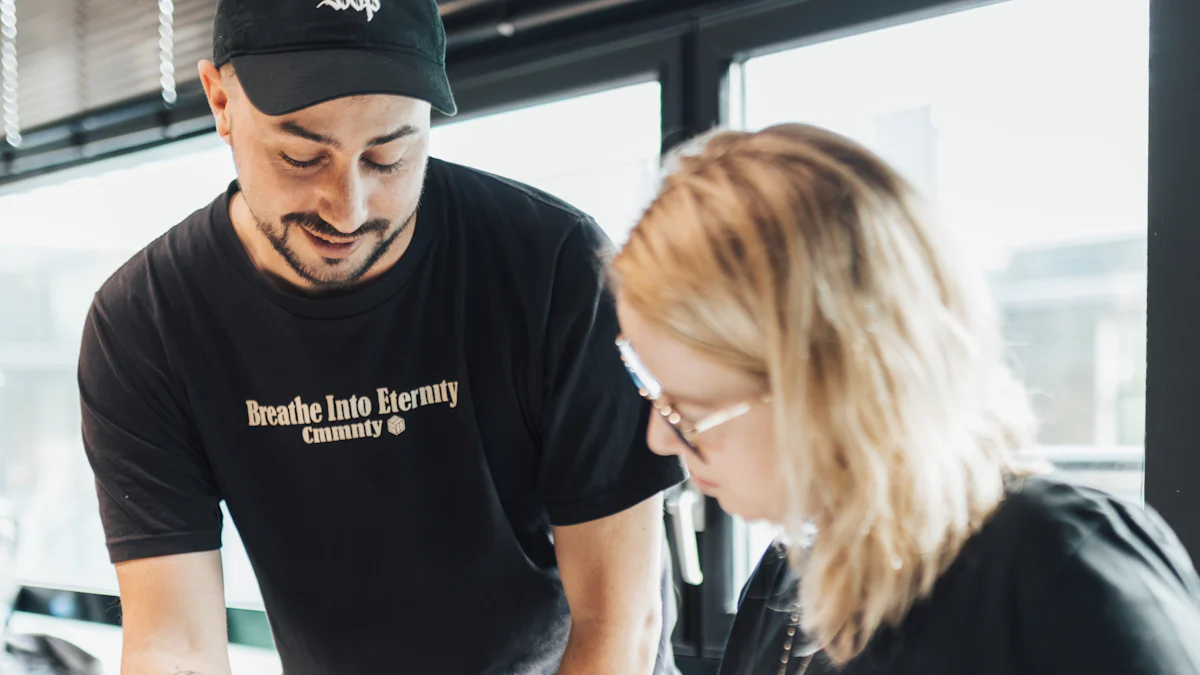Tips to Succeed in Open Interviews in 2025
Try Aihirely for
Smarter Interview Prep
Experience real-time AI support tailored to your Resume.
Boost your confidence and ace every question with
AI Mock Interview.

Image Source: pexels
Open interviews are hiring events where you can meet employers without scheduling an appointment. They’ve become more popular in 2025 because they make hiring faster and less stressful. You get a chance to showcase your skills in a relaxed setting and might even receive immediate feedback. To succeed, focus on preparation, confidence, and follow-up.
Key Takeaways
-
Research the company and role before the interview. This shows your seriousness and helps you stand out.
-
Prepare a strong elevator pitch. Keep it short and focus on your skills and enthusiasm for the job.
-
Send a thank-you email within 24 hours after the interview. This small gesture leaves a positive impression.
Preparing for Open Interviews
Research the Company and Role
Before stepping into open interviews, take time to learn about the company and the role you’re applying for. This preparation shows you’re serious and helps you stand out. Start by exploring the company’s website, especially the “About Us” and “Mission Statement” sections. These give you a sense of their values and goals. Platforms like Glassdoor can provide insights into employee experiences and company culture.
Want to go the extra mile? Check recent news or social media updates about the company. You’ll discover their latest projects and public perception. If possible, connect with current or former employees for firsthand insights.
Referring to competitors during your interview can also impress employers. It shows you think strategically and are proactive about understanding the industry.
Review the Job Description Thoroughly
The job description is your roadmap. It outlines what the employer expects and helps you align your skills with their needs. Pay close attention to the qualifications and responsibilities listed. This ensures you’re prepared to discuss how your experience matches the role.
Avoid common mistakes like overlooking key details or getting distracted by buzzwords like “game changer.” Focus on the specifics that matter most to the role.
Update and Print Multiple Copies of Your Resume
Always bring several copies of your resume to open interviews. Even if you’ve submitted it online, having a physical copy shows you’re prepared. Make sure your resume is updated with your latest achievements and tailored to the job. Highlight skills and experiences that align with the role.
Practice Common Interview Questions Using the STAR Method
The STAR method (Situation, Task, Action, Result) is a great way to structure your answers. Practice answering questions like, “Describe a time you worked under pressure” or “Tell me about a project you’re proud of.” Rehearsing these helps you stay concise and impactful.
You can even ask friends or mentors for feedback. Platforms like LinkedIn are also useful for practicing and refining your responses.
Plan Your Attire for a Professional First Impression
Your outfit speaks before you do. Choose attire that’s professional yet comfortable. For example, blazers in neutral colors paired with tailored pants or a knee-length dress work well. Closed-toed shoes like loafers or flats are safe choices.
If you’re unsure about the company’s dress code, aim for business casual. This strikes a balance between professionalism and comfort.
Prepare an Elevator Pitch to Introduce Yourself
An elevator pitch is your chance to make a strong first impression. Keep it short—about 30 seconds—and focus on your background, skills, and what makes you a great fit for the role. For example, start with your current position, highlight two key qualifications, and express enthusiasm for the company.
Tailor your pitch to the job. If teamwork and adaptability are valued, mention examples that showcase these qualities. Practice until it feels natural and confident.
Performing Well During Open Interviews

Image Source: pexels
Arrive Early to Demonstrate Punctuality
Arriving early sets the tone for your interview. It shows you’re punctual and genuinely interested in the position. Plus, being one of the first candidates can give you an edge. Aim to arrive at least 15-20 minutes before the event starts. This gives you time to settle in, review your notes, and prepare mentally.
Pro tip: Use this extra time to observe the environment. You might pick up useful details about the company culture or the interview process.
Stay Organized and Patient While Waiting
Open interviews can get busy, with multiple candidates waiting their turn. Keep your documents, like your resume and portfolio, neatly organized in a folder. Staying calm and patient while waiting reflects your professionalism. If you feel nervous, take deep breaths or review your elevator pitch to stay focused.
Use Confident Body Language to Make a Positive Impression
Your body language speaks volumes. Maintain eye contact to show engagement. Sit up straight to appear confident and attentive. Use natural gestures to emphasize your points, but avoid crossing your arms or fidgeting. These small actions convey enthusiasm and professionalism, leaving a lasting impression on the interviewer.
Remember: Mirroring the interviewer’s body language subtly can help build rapport and make the conversation flow more naturally.
Listen Actively and Tailor Your Responses
Active listening is key to answering questions effectively. Pay close attention to what the interviewer says. Use techniques like maintaining eye contact, nodding, and summarizing their points to show you’re engaged. For example, if they mention teamwork, highlight a project where you collaborated successfully.
| Technique | Description |
|---|---|
| Open-ended questions | Encourage dialogue and gain deeper insights into the interviewer’s needs. |
| Eliminate distractions | Silence your phone and focus entirely on the conversation. |
| Eye contact and nodding | Show engagement and understanding. |
| Summarizing | Confirm your understanding by briefly restating key points. |
| Taking notes | Jot down important details to stay organized and attentive. |
Engage with the Interviewer and Ask Thoughtful Questions
Interviews are a two-way street. Asking thoughtful questions shows you’re genuinely interested in the role and the company. For instance, you could ask, “What does success look like in this position?” or “What’s the team dynamic like?” These questions demonstrate curiosity and help you decide if the role is a good fit for you.
Highlight Your Unique Skills and Experiences
Stand out by showcasing what makes you unique. Share specific examples of your skills and how they’ve made a difference in past roles. For instance, if you have a niche skill that aligns with the job, explain how it can benefit the company. Be confident but avoid dominating the conversation. Balance is key.
Tip: Focus on how your unique strengths can solve problems or add value to the company. This approach makes your application more memorable.
Following Up After Open Interviews
Send a Thank-You Email or Note Promptly
After the interview, send a thank-you email or note within 24 hours. This small gesture leaves a lasting impression and shows your professionalism. Keep it short and genuine. Mention something specific from the interview, like a topic you discussed or a detail about the company that excited you. For example, you could write, “Thank you for taking the time to meet with me today. I enjoyed learning about your team’s innovative approach to project management.”
Tip: Double-check your email for typos or errors before hitting send. A polished message reflects your attention to detail.
Reflect on Your Performance to Identify Areas for Improvement
Take a moment to think about how the interview went. Did you answer questions confidently? Were there moments where you felt unsure? Write down your thoughts while they’re fresh. This reflection helps you pinpoint areas to improve for future open interviews. If possible, ask for feedback from the interviewer. Their insights can guide you in refining your approach.
Follow Up Professionally if You Haven’t Heard Back
If you don’t hear back after a week or two, it’s okay to follow up. Keep your message polite and professional. Start by expressing your continued interest in the role. Then, ask for an update on the hiring process. Here’s an example:
Hi [Interviewer’s Name],
I hope you’re doing well. I wanted to follow up regarding the [Job Title] position I interviewed for on [Date]. I’m excited about the opportunity and would love to know if there are any updates on the next steps. Thank you for your time!
Best regards,
[Your Name]
If you still don’t get a response, send a second email after another week. Persistence shows your enthusiasm, but avoid overdoing it.
Avoid common mistakes like giving up too soon or sending overly casual messages. Professionalism is key.
Stay Positive and Continue Preparing for Future Opportunities
Job searching can be tough, but staying positive makes a big difference. Focus on what you learned from the interview and how you can improve. Make a list of your strengths and accomplishments to remind yourself of your value. Keep preparing for future opportunities by practicing interview skills and updating your resume.
Remember, your worth isn’t tied to a single job. Stay proactive and keep moving forward. Every interview, even if it doesn’t lead to an offer, is a step closer to your goal.
Preparation, confidence, and follow-up are your keys to success in open interviews. Research the company, craft a strong elevator pitch, and send a thank-you email afterward. These steps show professionalism and enthusiasm. Open interviews are more than just hiring events—they’re opportunities to showcase your strengths and grow. Stay proactive, and you’ll stand out every time!
FAQ
What should you bring to an open interview?
Bring multiple copies of your resume, a pen, a notebook, and any relevant certifications. A professional folder helps keep everything organized and presentable.
Tip: Carry a bottle of water to stay hydrated during long waits.
How do you handle nerves before an open interview?
Take deep breaths and focus on your strengths. Practice your elevator pitch beforehand. Arriving early gives you time to relax and adjust.
Can you attend an open interview without meeting all the qualifications?
Yes! Highlight transferable skills and show enthusiasm for learning. Employers value adaptability and a positive attitude as much as technical qualifications.
Note: Confidence can often outweigh minor skill gaps.
